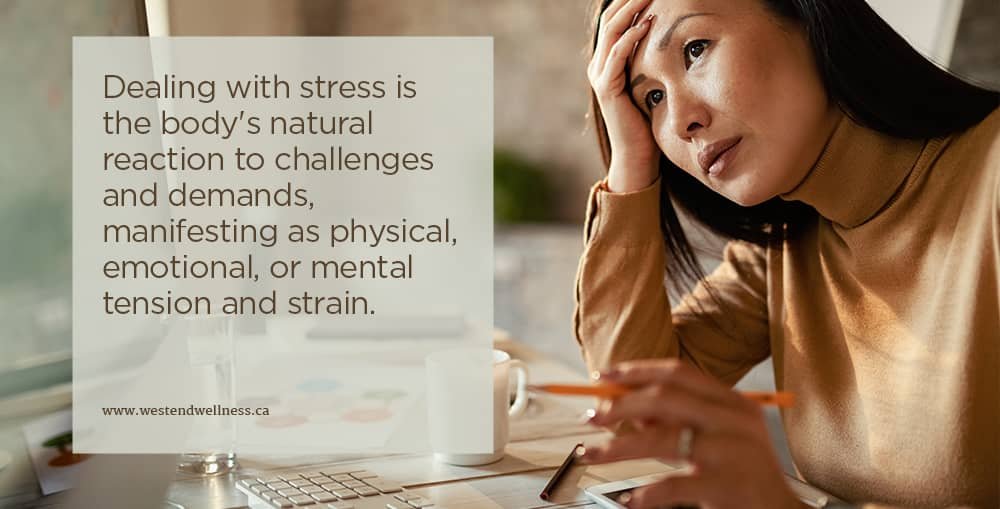Acupuncture for Stress Relief: Discover Natural Solutions
Table of Contents Show
Stress is a joy that can either put a healthy level of pressure on us to rise to the occasion or be a dreadful burden that ends up crippling us with what ends up feeling like no escape.
Here at West End Wellness, we are dedicated to your holistic health and well-being; we understand how stress can intricately weave into the fabric of our daily lives.
In this bustling world, managing stress is not just a luxury; it's a necessity for maintaining overall health. Those who suffer from chronic stress will be advised to take medication to help manage their stress.
But there is another practical, time-honoured approach to managing stress, blending ancient wisdom with modern applications. You guessed it, it is Acupuncture.
Let us explain and shed light on Acupuncture's effectiveness in alleviating stress. Whether you're encountering Acupuncture for the first time or seeking a deeper understanding of its stress-relief benefits, this guide is with you in mind.
Within our article, we want to break down the concept of stress, the workings of Acupuncture, and its potential to be a key component in your wellness regimen. Join us as we explore the transformative power of Acupuncture in achieving a balanced, stress-free life.
Understood. I'll adjust the writing style to primarily use third-person narration, only shifting to first-person when directly relating to the treatment or to emphasize a point. Let's proceed with the next section on understanding stress.
Stress is the body's response to challenges or demands
Understanding Stress
We all live in a fast-paced environment where stress has become a ubiquitous part of life. Often misunderstood, stress is the body's natural response to challenges or demands.
It's a complex interplay of emotional, physical, and psychological reactions that occur when an individual faces a situation that is perceived as challenging or threatening.
Stress can manifest in various forms, ranging from the everyday pressures of balancing work and personal life to more intense experiences of chronic stress, which can lead to serious health concerns like heart attacks, anxiety, depression, and even obesity.
Here are the five most common forms of stress someone may experience:
Acute Stress: This is the most common type of stress, often resulting from recent challenges or immediate demands. It's short-term and usually associated with small, day-to-day challenges and demands, like meeting deadlines, dealing with traffic jams, or managing minor conflicts.
Occupational Stress: Many people experience stress in their workplace due to workload, pressure to meet targets, job security concerns, challenging work environments, or difficult relationships with colleagues or superiors.
Social Stress: This type of stress arises from interactions with others and social situations. It can include stress related to social events, relationships with friends and family, social pressures, and feelings of a lack of social support or loneliness.
Financial Stress: Concerns over finances, such as managing debts, budgeting, and worries about job stability or income, are familiar sources of stress for many individuals.
Chronic Stress: This is a prolonged form of stress stemming from ongoing life circumstances, such as long-term health problems, lasting relationship difficulties, or persistent financial issues. Unlike acute stress, it doesn't have a clear endpoint and can significantly impact overall health and well-being.
The body's reaction to stress involves a surge of hormones designed to enable a quick response, often referred to as the 'fight or flight' response.
While this response can be lifesaving in emergencies, prolonged exposure to stress hormones can have detrimental effects on physical and mental health. It's here that alternative therapies like Acupuncture come into play.
Acupuncture, known for its potential in stress and anxiety relief, offers a unique approach to managing these challenges. By addressing the physical and emotional aspects of stress, Acupuncture presents a holistic path to wellness.
So now you see where we are going. Let us give you an overview of acupuncture and how it can help manage stress.
Acupuncture for Stress Relief: An Overview
Acupuncture, an ancient practice from traditional Chinese medicine, can influence stress management. The reason is that the practice has been deeply rooted in harmonizing the body's energy flow, which stress often disrupts.
A key aspect of Acupuncture's effectiveness in stress relief lies in its ability to regulate the body's nervous system. This regulation is closely linked to the Vagus Nerve, which is crucial in mediating stress response.
For those interested in the intricate relationship between Acupuncture and the Vagus Nerve, our article "The Vagus Nerve" provides a more in-depth exploration.
But to finish this section, stimulating specific acupuncture points modulates the nervous system's activity, decreasing stress hormone production and promoting relaxation.
This helps alleviate the immediate symptoms of stress and contributes to a long-term sense of well-being. This therapy's ability to stimulate endorphins, the body's natural mood elevators, further enhances its stress-reducing effects.
Acupuncture, with its holistic approach, not only addresses the symptoms of stress but also promotes overall health, resonating with our philosophy of integrated, whole-person wellness.
But now you might wonder, "How Long Before I Feel it working?"
How Long Does It Take for Acupuncture to Work for Stress?
One of the most common questions regarding Acupuncture for stress relief is, "How quickly can one expect results?" The answer, while varying from person to person, sheds light on the nature of Acupuncture as a therapy.
Typically, the response to Acupuncture is entirely individualized. Some people may experience immediate relief after their first session, feeling a sense of relaxation and calmness.
For others, it might take several sessions to observe noticeable changes. This variation depends on factors like the individual’s overall health, the severity and duration of their stress, and their body's responsiveness to Acupuncture.
A standard course of acupuncture treatment for stress might involve weekly sessions for five to eight weeks, with each session lasting about 30 to 60 minutes.
Stress is an unavoidable challenge of our lives; and so why not take a quick look at our 7 relaxation tips for reducing stress.
However, practitioners like those here at West End Wellness often recommend a personalized treatment schedule based on the individual's specific needs and response to the therapy.
It’s also important to consider that Acupuncture works cumulatively. The benefits often build up with each session, leading to a more profound and lasting impact.
This aspect is essential in managing chronic stress, where ongoing treatment can contribute significantly to long-term stress reduction and overall wellness.
In addition to the frequency and duration of sessions, integrating Acupuncture with other stress-reduction techniques and lifestyle changes can enhance its effectiveness.
Practices like mindfulness, meditation, and regular physical activity, combined with Acupuncture, can provide a comprehensive approach to managing stress.
Ultimately, Acupuncture is not just a 'quick fix' but a journey towards holistic well-being. It encourages the body to heal naturally and restore balance, making it a valuable long-term stress management strategy component.
Safety and Side-Effects of Acupuncture
Understanding any therapeutic intervention's safety and potential side effects is crucial. Acupuncture, known for its minimal and mild side effects, is generally considered a safe treatment when performed by a qualified and experienced practitioner.
One of the primary advantages of Acupuncture is its non-pharmacological nature, making it an appealing option for those seeking drug-free treatments.
Unlike many conventional stress-relief medications, Acupuncture doesn't pose a risk of adverse drug reactions or dependency. However, like any medical procedure, there are some considerations to remember.
Common side effects of Acupuncture are typically minor and transient. These may include slight bruising, bleeding at the needle sites, or mild soreness. Some individuals might also experience temporary changes in mood or energy levels as their body adjusts to the treatment.
It's important to communicate openly with your acupuncture practitioner about your health history and concerns. A qualified practitioner will ensure proper needle sterilization and follow precise insertion techniques to minimize risks.
Furthermore, it's worth noting that while Acupuncture is a valuable tool for stress management, it should be considered as part of a broader wellness strategy.
For conditions like chronic stress, it's beneficial to combine Acupuncture with other lifestyle adjustments and therapies for optimal results.
Let's help wrap this up with the final question.
Is Acupuncture Worth It for Stress?
We have explained what and how Acupuncture can help manage stress, but can we say Acupuncture is worth it for stress? We believe it can be a notable option.
But it is also essential to consider various aspects, including its efficacy, approach to treatment, and overall impact on health.
Efficacy in Stress Reduction: Acupuncture's appeal in stress management lies in its proven efficacy. Acupuncture influences the nervous system by stimulating specific points in the body, reducing the production of stress hormones and increasing the release of endorphins, the body’s natural feel-good chemicals. This biochemical change fosters a sense of relaxation and well-being. Clinical studies and patient testimonials often highlight significant stress reduction following acupuncture treatments.
Holistic Treatment: Acupuncture doesn't just target stress symptoms; it aims to restore the body's overall balance. This holistic approach is beneficial in managing stress, as it addresses both the physical manifestations and the emotional roots of stress.
Customized Care: Acupuncture treatments are often tailored to the individual's needs. This personalized approach ensures that each person's specific stress-related issues are addressed, enhancing the effectiveness of the treatment.
Complementary to Conventional Therapies: Acupuncture can be integrated with other stress management techniques, such as cognitive-behavioral therapy, relaxation techniques, and lifestyle changes, providing a comprehensive approach to managing stress.
Minimal Side Effects: Being a non-invasive and drug-free therapy, Acupuncture is known for having minimal side effects. This makes it a particularly appealing option for those wary of the potential side effects of conventional stress medications.
In summary, considering its effectiveness in reducing stress, its holistic approach to treatment, personalization, compatibility with other therapies, and minimal side effects,
Acupuncture is indeed worth considering for those seeking a natural and effective way to manage stress. It offers a pathway to coping with stress and improving overall quality of life.
If you have any further doubts or questions regarding this subject or another treatment, contact one of our experienced Acupuncturists or Registered Massage Therapists here at West End Wellness Clinic. You can either give us a call or make an appointment.
Disclaimer: Please remember this article is for informational purposes only and should not replace professional medical advice. Please consult a healthcare provider or someone with the correct qualifications before starting any new exercise or treatment program.




